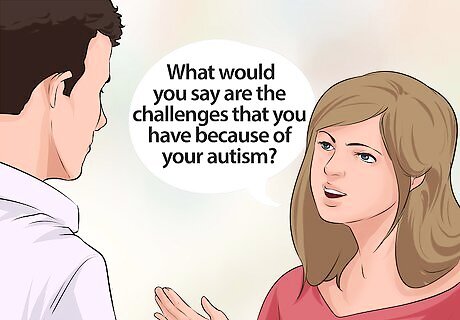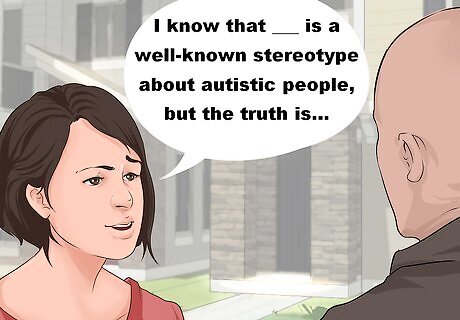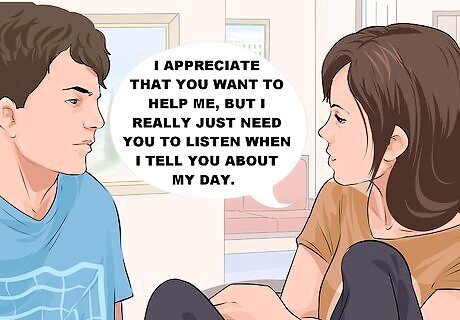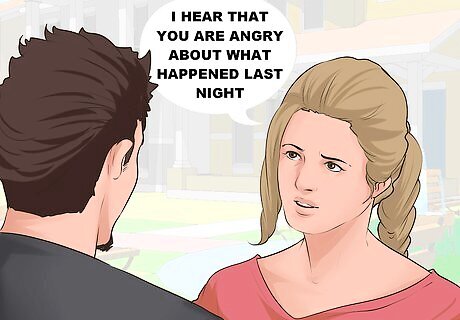
views
Understanding Your Boyfriend Better

Learn more about autism. By educating yourself about the condition and the challenges it may pose to your partner, you will have a better understanding of what he is dealing with on a daily basis. This knowledge may help you to be more patient, learn better ways to communicate with him, and even improve your relationship. Read general definitions of autism. Focus on books and articles written by autistic people, since they have firsthand experience on what it is like to live as an autistic person. Be careful of your sources; some autism groups that claim to speak for autistic people actually work hard to silence them.

Be aware of his communication challenges. Autistic people often struggle to communicate in the same ways that non-autistic people do. Some forms of expression may be too nuanced and difficult for them to understand and respond to. This may lead to misunderstandings and problems within a relationship. To avoid these problems, try to be as direct as possible when you speak to your boyfriend but don't be too direct as that will make him feel like scared to talk to you. For example, imagine you say something like, “Gina texted me earlier today.” You may expect him to ask you, “About what?” But your boyfriend might not understand that you are trying to have a conversation since you are not asking him a question. Instead, it might be better to ask him, “Do you want to know what Gina said when she texted me today?” or just tell him what she said. Every autistic person is different. Expect to learn and adjust over time as you get to know more about your boyfriend.

Anticipate social challenges. Social situations that are fun or easy for you might be stressful and difficult for your boyfriend. The loudness and crowding of some social situations might cause your boyfriend to feel anxious and have a hard time concentrating on what people are saying. Your boyfriend might also have a hard time making introductions or small talk. Try writing a letter to your boyfriend about what his role is in social gatherings. Use direct language and only discuss one issue at a time. For example, you might write a letter focusing on why you want him to attend parties with you. Work together on making social situations more comfortable for him. Perhaps he'd be able to handle parties if he could slip away to take a break every half hour or so, or if you set a time at which you'd leave early so he'd know he wouldn't have to handle it for much longer.

Discuss physical challenges. Some autistic people do not like to be touched or know when it is appropriate to give physical affection. Therefore, your boyfriend may not know when you want him to hug you or he may not like it when you touch him without warning. Discuss these things with him to make it easier for you to have a better physical connection. For example, after something upsetting has happened, you could say to your boyfriend, “I'm feeling really upset right now. Could you please give me a hug? It would help me to feel better.”

Accept repetitive behavior. Some autistic people may have certain routines that help them to feel better. If these routines are disrupted, they may feel anxious and get upset. Try to be understanding about any routines that your boyfriend has that help him to feel more comfortable. Do what you can to avoid disrupting those routines. For example, if your boyfriend goes for a run every day at 7:00pm, be respectful of this time and do not try to prevent him from doing his normal routine. Stimming, such as flapping hands or watching lights, is another common autism symptom. Assume that these actions are important, even if you don't understand why he does them.

Ask your boyfriend about his needs. Every autistic person is different. Your boyfriend might have some very specific challenges that other autistic people do not have. Try asking some questions to better understand his challenges and preferences. This will help you to be more considerate of his needs. For example, you could say something like, “I want to know more about things that you struggle with so that I can be more considerate. What would you say are the challenges that you have because of your autism?” Be sure to ask about his personal boundaries regarding touch. For example, does it bother him to be hugged? Do you need to tell him before you are going to hug him?

Be aware of comorbid disabilities. Autistic people may have anxiety, depression, and other mental illnesses. Disabled people, particularly people who have trouble with communication and emotional processing (including many autistic individuals), are more at risk for sexual abuse by care givers of many different job roles. or others, and this may lead to Post-Traumatic Stress Disorder. Be sensitive and supportive about any challenges your boyfriend faces. If he was abused when he was little by former classmates or people in his life, he may or may not want to share the details with you. The best way you can help is by respecting his desire not to disclose the details but if he wants to disclose the details to you just simply listen to him and make sure it doesn't happen to him again and make sure to stand up for him if he gets bullied again, or by gently offering that he see a doctor (but not pushing him) if he is very stressed about it.

Ditch the stereotypes. There are many stereotypes about autism, like that autistic people are incapable of love or emotions, but these are not true. Autistic people have many emotions just like neurotypicals do they simply express them differently. Be an advocate for autistic people by pointing out incorrect assumptions about the condition when you encounter them. Try starting by saying something like, “I know that ___ is a well-known stereotype about autistic people, but the truth is…” Current research has even shown that autistic people may have deeper or more intense emotional capacities than non-autistic people.
Dealing with Differences in Communication

Be prepared for honest answers. Sometimes people who care about each other will tell little white lies or sugar coat the truth out of consideration for their partner’s feelings. Autistic people may not do this. Instead, you might get some very honest answers from your boyfriend. These answers are not meant to be hurtful, it is just how your boyfriend communicates. For example, if you ask your boyfriend, “Do I look good in this yellow top?” you might expect or want him to say yes. But autistic people might respond with “no” if they do not think that you do. Therefore, you may want to avoid asking questions that you think might result in an answer that will upset you. Remember that honesty is your boyfriend's way of trying to help you.

Answer his questions. Since some autistic people struggle to understand sarcasm or other non-literal forms of communication, you may have situations where your boyfriend asks you a lot of questions. Don’t get upset if this happens to you. Remember, he asks questions because he cares about you and wants to understand you.

Say how you feel. Remember that body language and other non-verbal cues may be difficult for autistic people to understand. Instead of trying to communicate with your boyfriend using non-verbal cues, say how you are feeling or what you are thinking. By stating your feelings or thoughts instead of trying to get your boyfriend to guess at them, you may avoid an uncomfortable situation or even an argument. For example, when a non-autistic person like you avoids eye contact, it is often a sign of being disinterested or upset. But for an autistic person, avoiding eye contact is normal and often not a sign of anything. It helps to say "I'm really stressed today" or "I had a bad day." By extension, if he fails to make eye contact with you, do not take it as a sign that he's disinterested in you or ignoring you, unless he tells you so. If he is doing something that bothers you, tell him. Dropping hints or being silent and then snapping at him won't help. Be straightforward so he can understand and make a change. For example, "Please don't chew with your mouth open. The sound really bothers me."

Let your boyfriend know how you would like him to respond. Some autistic people are not sure how to respond to certain situations or how to handle them either. But you can help your boyfriend understand what you need and expect of him by telling him how you’d like him to respond in those situations. For example, imagine that you get annoyed when you tell your boyfriend about your day at work and he tries to advise you on what to do. Just tell him something like, “I appreciate that you want to help me, but I really just need you to listen when I tell you about my day.”
Being a Team

Be open to initiating more. Autistic people can have trouble initiating things, or may not know what to do and whether it's appropriate or not. You can make this easier by initiating the things you'd like to happen, whether it's flirting or kissing. In addition to struggling with social situations, some autistic people lack a drive or an understanding of sexuality or sexual connotations. Therefore, he might say or do something that has a sexual implication or double-entendre that he was totally unaware of. For example, he might ask you over to a sleepover with him, having completely innocent non-sexual intentions, not understanding that this would be taken as a sexual proposition by most girls. In this case, explain to him that connotations and feelings of intimacy and sexuality go on in a bedroom atmosphere at night between people of the opposite sex, and that social sleepovers are typically reserved for younger participants or groups of the same sex like mostly sleepovers for boys only or girls only. It could potentially happen that by his avoiding eye contact with you in conversation, because of his autistic nature, he appears to be staring at your breasts or another sensitive part of your body. Don't freak out, or assume that he's being creepy. Simply tell him, "I don't feel comfortable when you look in that direction" and direct his gaze to your eyes or somewhere else. If you ever do want to get intimate or sexual with him, be sure that he has a complete understanding of what sexuality is, what it's about, and the nature of what he's consenting to if he consents to the activity.

Talk to him before discussing his autism with others or friends of yours. Some autistic people are fairly open about their disability and some are not, while others prefer if only a few people know. Talk with him about how he feels about his diagnosis, and whom he is okay with you telling his disability to.

Handle disagreements as calmly as possible. Discuss your feelings and thoughts with your boyfriend in a calm, straightforward manner. Although you may be entitled to feeling angry or hurt, a calm, straightforward approach may be much more effective than an emotional reaction. Becoming emotional may leave your autistic partner feeling confused about why you are upset or crying. Avoid making “you” statements such as, “You never,” “ You are not,” “ You need to,” etc. Instead, make “I” statements such as, “I feel,” “I think,” “I want,” etc. This is a general helpful approach that works for all people (not just autistic people).

Listen to your boyfriend. In order to understand your boyfriend’s perspective, it is important to listen and make your boyfriend feel heard. Make sure that you take the time to stop and listen to your boyfriend when he is speaking to you. Do not talk while he is speaking, just listen and try to understand what he is saying before you respond back to him.

Validate your boyfriend’s feelings. Validating the other person’s feelings or concerns means acknowledging them and not minimizing them. Even if you feel like your boyfriend’s perspective is flawed, you need to accept what he has said in order to keep the lines of communication open in your relationship. Seek to understand first, then respond. If you don't know why he feels a certain way, ask, and listen closely to his response in what he has to say. For example, instead of responding with something like “There is no reason to be angry about what happened last night.” Try saying something like, “I hear that you are angry about what happened last night.”

Support his self-esteem. Autistic people often struggle with low self-esteem or low confidence, as they may be told that they are burdens or toddlers who won't shut up because of their autism or associated with unusual or weird "behaviors." Offer him plenty of support and reassurance, especially on his bad days or his worst days. Just always support him for who he is. Encourage him to get help if he exhibits signs of depression or suicidal thoughts. In these cases, the best thing to do is to find out what is causing it. Say things like "Are you depressed?", "Are you frustrated?", etc. Don't say things like "You're manipulative" or even "I'm going to put you in a psychiatric hospital," as this would be very cruel of you, as would breaking up with him over this, since it's not a reason.

Accept him for who he is. Autism is a part of your boyfriend's or husband's experiences, personality, and life. This won't change. Love him unconditionally with all of your heart, autism and all.




















Comments
0 comment